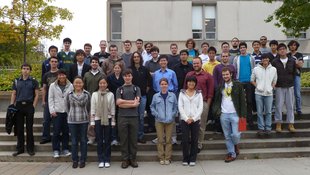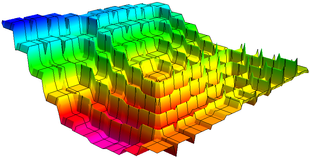10-327/Homework Assignment 5: Difference between revisions
No edit summary |
(EDIT: moved Kai's HW5 solutions to new page) |
||
| (16 intermediate revisions by 2 users not shown) | |||
| Line 1: | Line 1: | ||
{{10-327/Navigation}} |
{{10-327/Navigation}} |
||
{{In Preparation}} |
|||
===Reading=== |
===Reading=== |
||
Read sections 26 and 27 in Munkres' textbook (Topology, 2nd edition). Remember that reading math isn't like reading a novel! If you read a novel and miss a few details most likely you'll still understand the novel. But if you miss a few details in a math text, often you'll miss everything that follows. So reading math takes reading and rereading and rerereading and a lot of thought about what you've read. Also, '''preread''' sections 28 and 29, just to get a feel for the future. |
'''Read''' sections 26 and 27 in Munkres' textbook (Topology, 2nd edition). Remember that reading math isn't like reading a novel! If you read a novel and miss a few details most likely you'll still understand the novel. But if you miss a few details in a math text, often you'll miss everything that follows. So reading math takes reading and rereading and rerereading and a lot of thought about what you've read. Also, '''preread''' sections 28 and 29, just to get a feel for the future. |
||
===Doing=== |
===Doing=== |
||
Solve the following problems from Munkres' book, though submit only the <u>underlined</u> ones: Problems |
Solve the following problems from Munkres' book, though submit only the <u>underlined</u> ones: Problems 1, <u>4</u>, <u>5</u>, 6, <u>7</u>, 8, <u>9</u>, 12 on pages 170-172, and problem <u>2</u> on page 177. (For the last, recall that <math>d(x,A):=\mbox{inf}_{a\in A}d(x,a)</math>). |
||
===Due date=== |
===Due date=== |
||
This assignment is due at the end of class on Thursday, November |
This assignment is due at the end of class on Thursday, November 11, 2010. |
||
{{Template:10-327:Dror/Students Divider}} |
{{Template:10-327:Dror/Students Divider}} |
||
*Question. In 4. By bounded metric space you mean there exists a point and an epsilon where this epsilon nbd contains everything in the metric space? -Kai |
|||
** Indeed so, though usually when talking about boundedness, people use the letter <math>M</math> and not the letter <math>\epsilon</math>. It makes no difference, of course. |
|||
Latest revision as of 21:54, 10 December 2010
| ||||||||||||||||||||||||||||||||||||||||||||||||||||||||||||
Reading
Read sections 26 and 27 in Munkres' textbook (Topology, 2nd edition). Remember that reading math isn't like reading a novel! If you read a novel and miss a few details most likely you'll still understand the novel. But if you miss a few details in a math text, often you'll miss everything that follows. So reading math takes reading and rereading and rerereading and a lot of thought about what you've read. Also, preread sections 28 and 29, just to get a feel for the future.
Doing
Solve the following problems from Munkres' book, though submit only the underlined ones: Problems 1, 4, 5, 6, 7, 8, 9, 12 on pages 170-172, and problem 2 on page 177. (For the last, recall that [math]\displaystyle{ d(x,A):=\mbox{inf}_{a\in A}d(x,a) }[/math]).
Due date
This assignment is due at the end of class on Thursday, November 11, 2010.
| Dror's notes above / Student's notes below |
- Question. In 4. By bounded metric space you mean there exists a point and an epsilon where this epsilon nbd contains everything in the metric space? -Kai
- Indeed so, though usually when talking about boundedness, people use the letter [math]\displaystyle{ M }[/math] and not the letter [math]\displaystyle{ \epsilon }[/math]. It makes no difference, of course.

